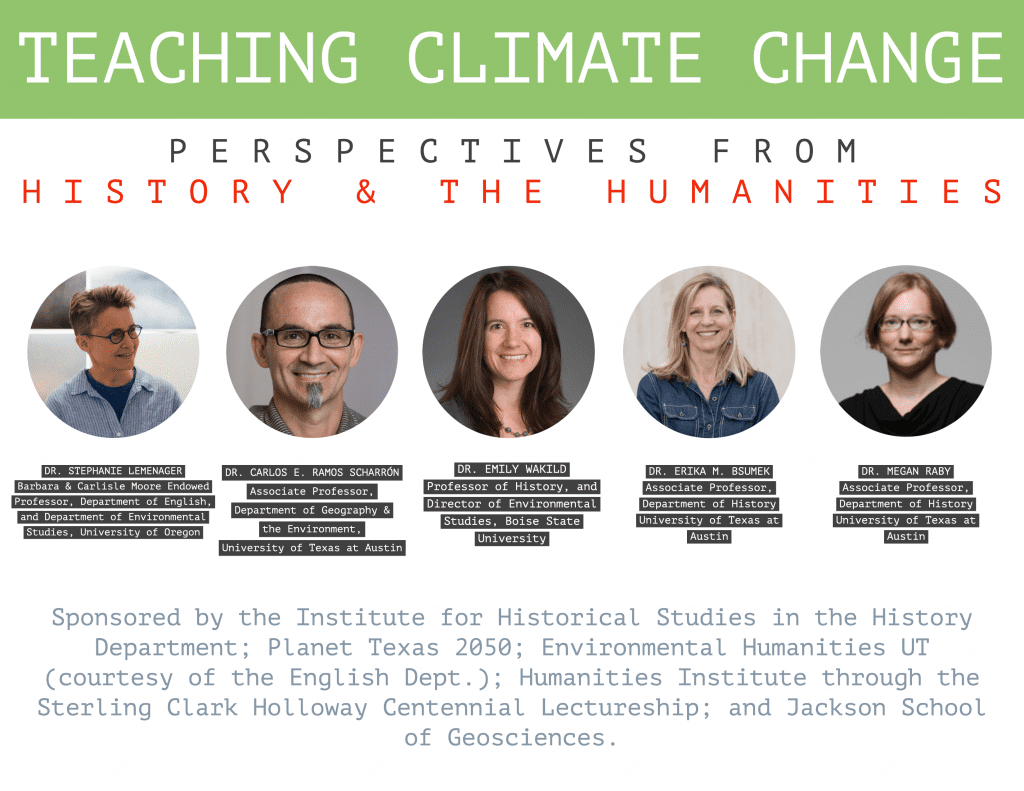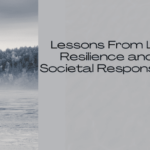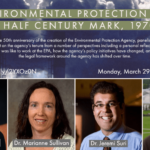Institute for Historical Studies, Thursday March 11, 2021
Featured Speakers:
“Climate Change Has No Discipline”
DR. STEPHANIE LEMENAGER
Barbara and Carlisle Moore Endowed Professor
Department of English, and Department of Environmental Studies
University of Oregon
https://www.stephanielemenager.com/
https://english.uoregon.edu/profile/slemen
Professor LeMenager will discuss the process or assembling her co-edited book, Teaching Climate Change in the Humanities, with Drs. Stephen Siperstein and Shane Hall. In particular, the talk will focus on the editors’ decision not to make the book about the Environmental Humanities, but rather to conceive of ways to integrate the science and experiences of climate crisis into diverse Humanities fields and classrooms.
“Cambio Climático: Covering Climate Change as a Topic in a Latin American Studies Program”
DR. CARLOS E. RAMOS SCHARRÓN
Associate Professor, Department of Geography and the Environment
University of Texas at Austin
https://liberalarts.utexas.edu/geography/faculty/cer577
Through this brief presentation Professor Ramos-Scharrón will provide examples of some of the interdisciplinary content covered in two of his Latin American Studies courses: Water Resources Issues and Vulnerability to Natural Hazards. Although climate change is not the central theme of these courses, inserting climate change as vital in understanding environmental challenges affecting Latin American and Caribbean countries becomes even more evident and pressing every time he finds himself refreshing course materials. Examples to be discussed will include the diversity of physical and social responses associated to deglaciation in the Andes, climate change as a convenient excuse of government officials to avoid responsibility when climate strikes in the form of severe rainstorms and drought in Colombia, and climate change as an agent of social disturbance through forced migration using Hurricane Mitch, Eta and Iota in Honduras and Hurricane María in Puerto Rico.
“Why Teaching Climate History is a Spiritual and Moral Imperative”
DR. EMILY WAKILD
Professor of History, and Director of Environmental Studies
Boise State University
https://emilywakild.weebly.com/
https://www.boisestate.edu/history/faculty-staff/emily-wakild/
This presentation reviews some of the reasons why teachers of history choose not to teach about climate change. Professor Wakild suggests ways climate change can be an integral part of a history course and offer examples of energy, cultural identities, and wildland fire as places to weave climate into traditional history classes. Teaching climate change does not have to be only about scientific data or geophysical facts; the moral, emotional, and cultural impacts of climate change have a natural fit in history classrooms, environmental and otherwise.
Discussants:
- Erika M. Bsumek
Associate Professor, Department of History
University of Texas at Austin
https://liberalarts.utexas.edu/history/faculty/bsumeke - Megan Raby
Associate Professor, Department of History
University of Texas at Austin
https://liberalarts.utexas.edu/history/faculty/mr46636
If you use any resources (online or printed) for teaching climate change and history in the humanities, please take a moment to let us know of any recommendations at this link. This talk is part of the Institute’s theme in 2020-2021 on “Climate in Context: Historical Precedents and the Unprecedented.”
—
Sponsored by the Institute for Historical Studies in the History Department; Planet Texas 2050; Environmental Humanities UT (courtesy of the English Dept.); Humanities Institute through the Sterling Clark Holloway Centennial Lectureship; and Jackson School of Geosciences.
The views and opinions expressed in this article or video are those of the individual author(s) or presenter(s) and do not necessarily reflect the policy or views of the editors at Not Even Past, the UT Department of History, the University of Texas at Austin, or the UT System Board of Regents. Not Even Past is an online public history magazine rather than a peer-reviewed academic journal. While we make efforts to ensure that factual information in articles was obtained from reliable sources, Not Even Past is not responsible for any errors or omissions.




